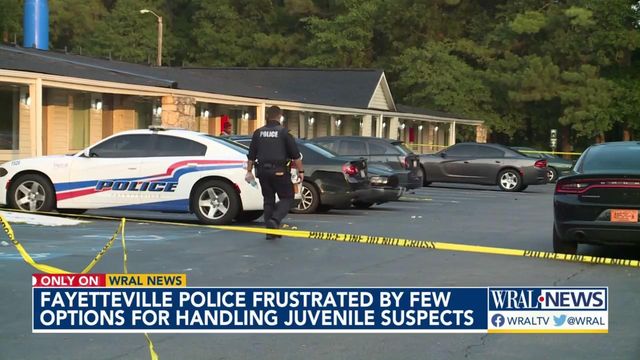Fayetteville police express frustration by few options for handling juvenile suspects
Law enforcement agencies across North Carolina said they're having a difficult time getting the Department of Juvenile Justice to approve secure custody orders for young offenders.
Posted — UpdatedThe law meant that 16- and 17-year-olds were no longer automatically prosecuted as adults. Now, members of law enforcement said juvenile offenders are getting even younger.
Fayetteville police told WRAL News they recently caught an 8-year-old and 12-year-old breaking into home.
A couple of weeks ago, teenagers led police on a high-speed chase, crashed and flipped their vehicle. It was a miracle no one was hurt, but police found automatic weapons in the car.
Fayetteville police said a drive-by shooting last week outside the Red Roof Inn on Cedar Creek involved two teenagers. That's where a woman was shot in the leg.
Two days earlier, a man was killed outside the Travelodge on the same road. Once again, police said the incident involved teens.
"It's getting to the point where it's reality, an 8-year-old doing crime,” said Fayetteville police Maj. Robert Ramirez. “And, that's not the first time.
“[We’ve seen] a 12-year-old and 13-year-old shooting at somebody.
Juvenile Justice Deputy Secretary William Lassiter said they've seen an uptick in crimes involving young offenders, and juvenile detention centers across the state are at 90% capacity.
"We are responding with more secure custody orders than we ever had than we have over the decade, but I do understand that sometimes our decision may be different than what law enforcement may be seeking in that particular case,” Lassiter said.
Ramirez called it a vicious circle.
“When we see 8-year-olds [or] 12-year-olds ... and its typical, it's not just an anomaly ... it's getting to a point that I'm not too sure that we're going to come up with a solution overnight with it,” Ramirez said.
Lassiter said the solution isn't just locking teens up.
"The reason why we do that is because we know mixing that kid that's low-risk, when they have committed a low-level crime, often causes that kid to pick up bad behavior and bad habits,” Lassiter said.
The state said granting secured custody for juvenile offenders is a very difficult balancing act.
“Our goal is to make sure that we maintain public safety, but also do what’s in the best interest of children,” Lassiter said.
Parents also bear some of the responsibility.
"We’ve got to stop saying, ‘Not my kid, not my grandkid, not my nephew, not niece,’” Ramirez said. “It is. It's our children doing this."
Lassiter said he understands the frustration of local law enforcement leaders. He’s planning to meet with sheriffs and police chiefs from across the state.
Related Topics
• Credits
Copyright 2024 by Capitol Broadcasting Company. All rights reserved. This material may not be published, broadcast, rewritten or redistributed.






